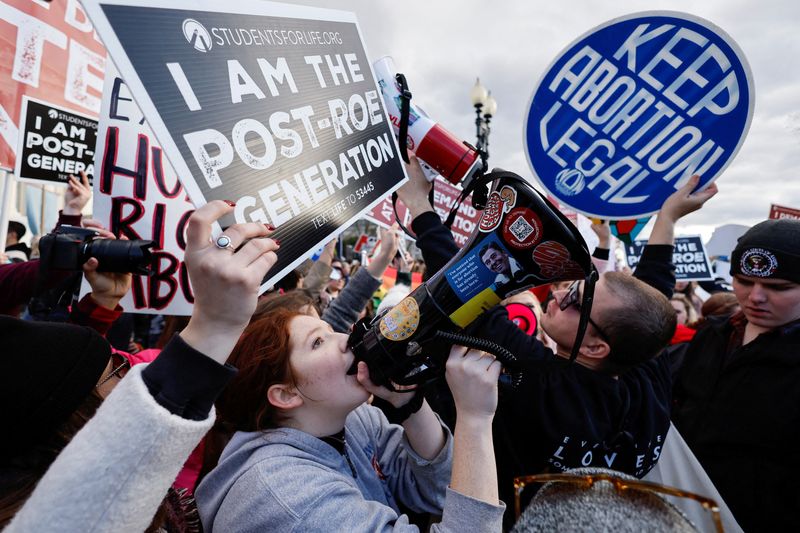By Jarrett Renshaw and Ahmed Aboulenein
WASHINGTON (Reuters) - The Biden administration on Wednesday proposed new privacy protections to prevent women's health information from being used to investigate or sue people who obtain or facilitate abortions.
The proposal by the U.S. Department of Health and Human Services is aimed at protecting women living in states where abortion is illegal who travel out of state to have the procedure done - something thousands of women are already doing, research shows. The rule would also protect healthcare providers, insurers, or other entities which perform or pay for abortions.
It is unclear whether the proposed rule would actually stifle criminal investigations. Fears of criminal investigations aimed at out-of-state abortions have grown after Idaho this month passed a law explicitly restricting some out-of-state travel for abortions.
Major companies, including JPMorgan Chase & Co (NYSE:JPM), Amazon.com Inc (NASDAQ:AMZN) and Walt Disney (NYSE:DIS) Co, have said they would pay travel costs for employees seeking abortions out of state and provide reimbursement through company-sponsored healthcare plans, but Republican leaders have threatened retribution.
The proposed rule, which is set to be finalized following a 60-day public comment period, strengthens existing privacy protections under the Health Insurance Portability and Accountability Act (HIPAA), which are binding in all states.
It amends the HIPAA Privacy Rule so that existing exceptions that allow the sharing of private health information do not apply to information related to reproductive healthcare - including abortion - for non-healthcare purposes.
The proposed rule specifically prohibits the "use or disclosure" of private health information by regulated entities, which include healthcare providers and health insurance companies among others, for these purposes, including:
"A criminal, civil, or administrative investigation into or proceeding against any person in connection with seeking, obtaining, providing, or facilitating reproductive health care that is lawful under the circumstances in which it is provided."
It also prohibits "the identification of any person for the purpose of initiating such an investigation or proceeding."
It was not clear, however, how that would work when pitted against state anti-abortion laws which are a matter of criminal, not healthcare, law.
The current HIPAA Privacy Rule says state laws that are contrary to it are preempted by the federal requirements. But it provides exceptions including "the reporting of disease or injury, child abuse, birth, or death, or for public health surveillance, investigation, or intervention."
It also permits - but does not require - the disclosure of protected health information to law enforcement officials under certain circumstances, including complying with court orders, warrants, subpoenas, or for the purposes of identifying or locating suspects and fugitives.
The proposed rule amends some definitions and clarifies others to prohibit the use of these exceptions when it comes to reproductive healthcare.
Vice President Kamala Harris on Friday hosted the third meeting of the Task Force on Reproductive Healthcare Access, an interagency group that has taken on added meaning following a decision by a federal judge in Texas to suspend the U.S. Food and Drug Administration's (FDA) 23-year-old approval of a key abortion drug.
"I do believe that America is facing a healthcare crisis," Harris said at the beginning of the meeting. "I have met with and talked with doctors who are in fear of losing their license or being prosecuted."
A string of judicial decisions and a spate of new state laws have banned women from getting abortions in many circumstances in large parts of the country after last summer's U.S. Supreme Court rollback of Roe vs. Wade.

A senior administration official, speaking on condition of anonymity before the rule was announced, said officials have heard directly from patients and their advocates about privacy concerns.
"They're scared. They are concerned about their medical information being misused and disclosed," the official said, adding that privacy concerns have had a chilling effect on woman seeking medical help.